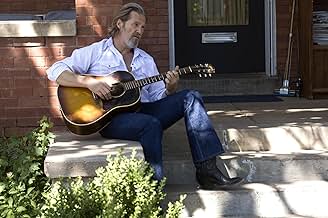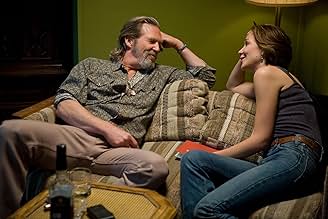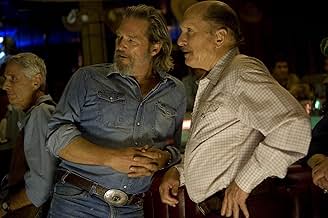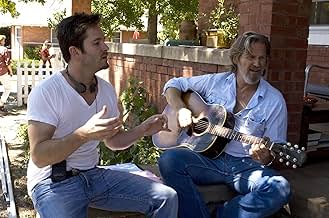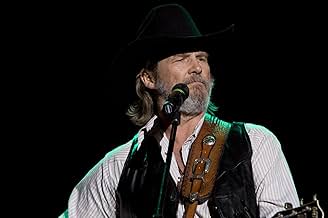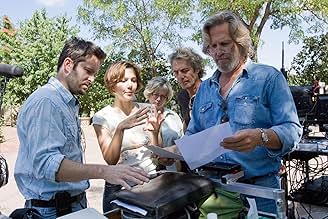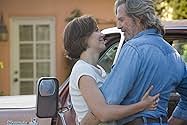Crazy Heart
- 2009
- Tous publics
- 1h 52min
NOTE IMDb
7,2/10
96 k
MA NOTE
Un musicien de country sur le retour est contraint de réévaluer sa vie dysfonctionnelle lors d'une histoire sentimentale vouée à l'échec, mais qui est aussi source d'inspiration.Un musicien de country sur le retour est contraint de réévaluer sa vie dysfonctionnelle lors d'une histoire sentimentale vouée à l'échec, mais qui est aussi source d'inspiration.Un musicien de country sur le retour est contraint de réévaluer sa vie dysfonctionnelle lors d'une histoire sentimentale vouée à l'échec, mais qui est aussi source d'inspiration.
- Récompensé par 2 Oscars
- 40 victoires et 33 nominations au total
Jerry Handy
- Cowboy
- (as Jerry Hardy)
J. Michael Oliva
- Bear
- (as J. Michael 'Yak' Oliva)
Jose Jacinto Marquez
- Older Hispanic Man
- (as Jose Marquez)
Histoire
Le saviez-vous
- AnecdotesJeff Bridges and Colin Farrell did their own singing in this film, with the assistance of voice coach Roger Love.
- GaffesThe first time Bad leaves Jean's house, the left front fender of the Suburban says "Silverado", the second time he leaves Jean's house, after the roll over, it says "Scottsdale" which means they used at least two trucks.
- ConnexionsFeatured in The Rotten Tomatoes Show: 2012/The Messenger/Fantastic Mr. Fox (2009)
- Bandes originalesHold On You
(2009)
Written by Stephen Bruton, T Bone Burnett, John Goodwin, and Bob Neuwirth
Performed by Jeff Bridges
Commentaire à la une
'Crazy Heart' is a simple but emotionally resonant movie about a 57-year-old alcoholic country singer whose career is on the skids. There's not much to the story, but not much is necessary with Jeff Bridges as the singer, Bad Blake; Colin Farrell as Tommy Sweet, his handsome acolyte, now a big country music star; Maggie Gyllenhaal as Jean Craddock, a small-time New Mexico journalist with a four-year-old boy who has lousy luck with men, and falls for Bad; and Robert Duvall as Wayne, the singer's clean-and-sober bartender-protector.
Bridges, Gyllenhaal and Farrell have never been better, and Duvall is always pure gold. This movie is Bridges' chance to give a master class in acting, and he does not disappoint for a minute, but he's not alone in the spotlight, and the depth of support he gets is what makes Crazy Heart worth watching.
A lifelong musician and many-talented artist (painting, photography, ceramics) whose thespian preeminence in Hollywood has yet to win him an Oscar, Jeff Bridges inhabits the songs he sings on screen as convincingly and seamlessly as he fits into the shambles of a life and mess of a body that is the film's protagonist. This musical integrity is important because Bad Blake is one of those disintegrating performers whose art has not faltered, though his life has. The songs he sings are his own, and when he's on stage, he's alive. The rest of the time he's lying, deceiving, or numbing out. A great line is when he's asked by Jean where his songs come from and he replies simply, "Life, unfortunately."
A parallel to Bridges' work in 'Crazy Heart' is the similarly lived-in and authentic performance as a waning dance hall singer by Gérard Depardieu in Xavier Giannoli's 'The Singer'/'Quand j'étais chanteur,' a richly atmospheric little film released but barely seen in the US. But the milieu here is very different, and as American as 'The Singer's' is French. First time director Scott Cooper has said this movie tells "Merle Haggard's' story and Kris Kristofferson's and Waylon Jennings'. As Bad Blake, Jeff moves like Waylon, he has Merle Haggard's songwriting ability and Kris Kristofferson's charisma." Of course Bridges looks a lot like Kristofferson, and Bad Blake puts his hard times into his felt, authentic compositions as Waylon and Merle did. The songs are composed by T Bone Burnett, and are fine; more authenticity is added through other songs such as Townes Van Zandt's "If I Needed You" and Waylon Jennings' "Are You Sure Hank Done It This Way." Burnett composed the songs with the late Stephen Bruton; and the closing ballad, "The Losing Kind," with Ryan Bingham. Farrell as well as Bridges does his own singing, and his Irishness merges fairly convincingly into a slick country style. Just as Bad Blake is the mentor of Tommy Sweet, in real life Robert Duvall has become a mentor of the actor-writer-director, so his presence anchors the film and presides over it. Bridges knew of the movie but held off from committing to it till he learned his friend Burnett was in, so this is project that must have felt right, ultimately, for all concerned.
Bridges' Bad Blake is so authentically blousy and pathetic he's hard to look at sometimes. He's always drunk and at an opening gig at a Pueblo, Coloradi bowling rink, throws up in a back alley between songs, while the young pickup band he's saddled with has to fill in. In Santa Fe Jean shows up to do an interview, and a May-December romance develops as Bad woos Jean against her better judgment and plies her little boy with homemade pancakes (the boy is hungry for a man in his life and Bad oozes charm, when he's conscious). Gyllenhaal, who played a character struggling with addiction and recovery herself in 'SherryBaby,' gives a performance as a women warring inside with loneliness and need. Her scenes with Bridges are central to the movie, and the chemistry is strong between them.
Blake hasn't written songs for some years, but when he meets up with Tommy prior to a date opening for him to an audience of 12,00 in Denver, Tommy begs him to write some for him. In this way the screenplay manages to steer a course, perhaps a bit too easily, between success and failure. Clearly Bad Blake is still working, even if it's at lousy venues, and to prove it he's always on the phone to a hard-nosed Manager (James Keane) who's finding him the best gigs he can. This eventually leads to a contract to compose songs for an album with Tommy.
'Crazy Heart,' which was written by Cooper from the eponymous novel by Thomas Cobb, is perhaps a bit schematic about the up-down-up trajectory of the talented loser, but it manages to be pretty realistic about the degeneration that is terminal alcoholism. Here, however, it's not a slide into hell like Mike Figgis' Leaving Las Vegas. Though only by the skin of his teeth, and with multiple ailments a car crash reveals, Bad is surviving. So when the moment comes and he hits his bottom, he still has the strength to straighten out. Maybe the fast-forward finale is a bit too upbeat, but the memory the movie leaves is, of course, of Bridges with a bottle, a guitar, and a sad sweet song, and of some of the year's best movie acting.
Bridges, Gyllenhaal and Farrell have never been better, and Duvall is always pure gold. This movie is Bridges' chance to give a master class in acting, and he does not disappoint for a minute, but he's not alone in the spotlight, and the depth of support he gets is what makes Crazy Heart worth watching.
A lifelong musician and many-talented artist (painting, photography, ceramics) whose thespian preeminence in Hollywood has yet to win him an Oscar, Jeff Bridges inhabits the songs he sings on screen as convincingly and seamlessly as he fits into the shambles of a life and mess of a body that is the film's protagonist. This musical integrity is important because Bad Blake is one of those disintegrating performers whose art has not faltered, though his life has. The songs he sings are his own, and when he's on stage, he's alive. The rest of the time he's lying, deceiving, or numbing out. A great line is when he's asked by Jean where his songs come from and he replies simply, "Life, unfortunately."
A parallel to Bridges' work in 'Crazy Heart' is the similarly lived-in and authentic performance as a waning dance hall singer by Gérard Depardieu in Xavier Giannoli's 'The Singer'/'Quand j'étais chanteur,' a richly atmospheric little film released but barely seen in the US. But the milieu here is very different, and as American as 'The Singer's' is French. First time director Scott Cooper has said this movie tells "Merle Haggard's' story and Kris Kristofferson's and Waylon Jennings'. As Bad Blake, Jeff moves like Waylon, he has Merle Haggard's songwriting ability and Kris Kristofferson's charisma." Of course Bridges looks a lot like Kristofferson, and Bad Blake puts his hard times into his felt, authentic compositions as Waylon and Merle did. The songs are composed by T Bone Burnett, and are fine; more authenticity is added through other songs such as Townes Van Zandt's "If I Needed You" and Waylon Jennings' "Are You Sure Hank Done It This Way." Burnett composed the songs with the late Stephen Bruton; and the closing ballad, "The Losing Kind," with Ryan Bingham. Farrell as well as Bridges does his own singing, and his Irishness merges fairly convincingly into a slick country style. Just as Bad Blake is the mentor of Tommy Sweet, in real life Robert Duvall has become a mentor of the actor-writer-director, so his presence anchors the film and presides over it. Bridges knew of the movie but held off from committing to it till he learned his friend Burnett was in, so this is project that must have felt right, ultimately, for all concerned.
Bridges' Bad Blake is so authentically blousy and pathetic he's hard to look at sometimes. He's always drunk and at an opening gig at a Pueblo, Coloradi bowling rink, throws up in a back alley between songs, while the young pickup band he's saddled with has to fill in. In Santa Fe Jean shows up to do an interview, and a May-December romance develops as Bad woos Jean against her better judgment and plies her little boy with homemade pancakes (the boy is hungry for a man in his life and Bad oozes charm, when he's conscious). Gyllenhaal, who played a character struggling with addiction and recovery herself in 'SherryBaby,' gives a performance as a women warring inside with loneliness and need. Her scenes with Bridges are central to the movie, and the chemistry is strong between them.
Blake hasn't written songs for some years, but when he meets up with Tommy prior to a date opening for him to an audience of 12,00 in Denver, Tommy begs him to write some for him. In this way the screenplay manages to steer a course, perhaps a bit too easily, between success and failure. Clearly Bad Blake is still working, even if it's at lousy venues, and to prove it he's always on the phone to a hard-nosed Manager (James Keane) who's finding him the best gigs he can. This eventually leads to a contract to compose songs for an album with Tommy.
'Crazy Heart,' which was written by Cooper from the eponymous novel by Thomas Cobb, is perhaps a bit schematic about the up-down-up trajectory of the talented loser, but it manages to be pretty realistic about the degeneration that is terminal alcoholism. Here, however, it's not a slide into hell like Mike Figgis' Leaving Las Vegas. Though only by the skin of his teeth, and with multiple ailments a car crash reveals, Bad is surviving. So when the moment comes and he hits his bottom, he still has the strength to straighten out. Maybe the fast-forward finale is a bit too upbeat, but the memory the movie leaves is, of course, of Bridges with a bottle, a guitar, and a sad sweet song, and of some of the year's best movie acting.
- Chris Knipp
- 5 janv. 2010
- Permalien
Meilleurs choix
Connectez-vous pour évaluer et suivre la liste de favoris afin de recevoir des recommandations personnalisées
Détails
- Date de sortie
- Pays d’origine
- Sites officiels
- Langues
- Aussi connu sous le nom de
- Con Tim Cuồng Say
- Lieux de tournage
- Hard Rock Pavilion - 5601 University Blvd SE, Albuquerque, Nouveau-Mexique, États-Unis(Bad opens for Tommy Sweet here at the Journal Pavilion.)
- Sociétés de production
- Voir plus de crédits d'entreprise sur IMDbPro
Box-office
- Budget
- 7 000 000 $US (estimé)
- Montant brut aux États-Unis et au Canada
- 39 464 306 $US
- Week-end de sortie aux États-Unis et au Canada
- 82 664 $US
- 20 déc. 2009
- Montant brut mondial
- 47 405 566 $US
- Durée1 heure 52 minutes
- Couleur
- Mixage
- Rapport de forme
- 2.35 : 1
Contribuer à cette page
Suggérer une modification ou ajouter du contenu manquant

Lacune principale
By what name was Crazy Heart (2009) officially released in India in English?
Répondre






